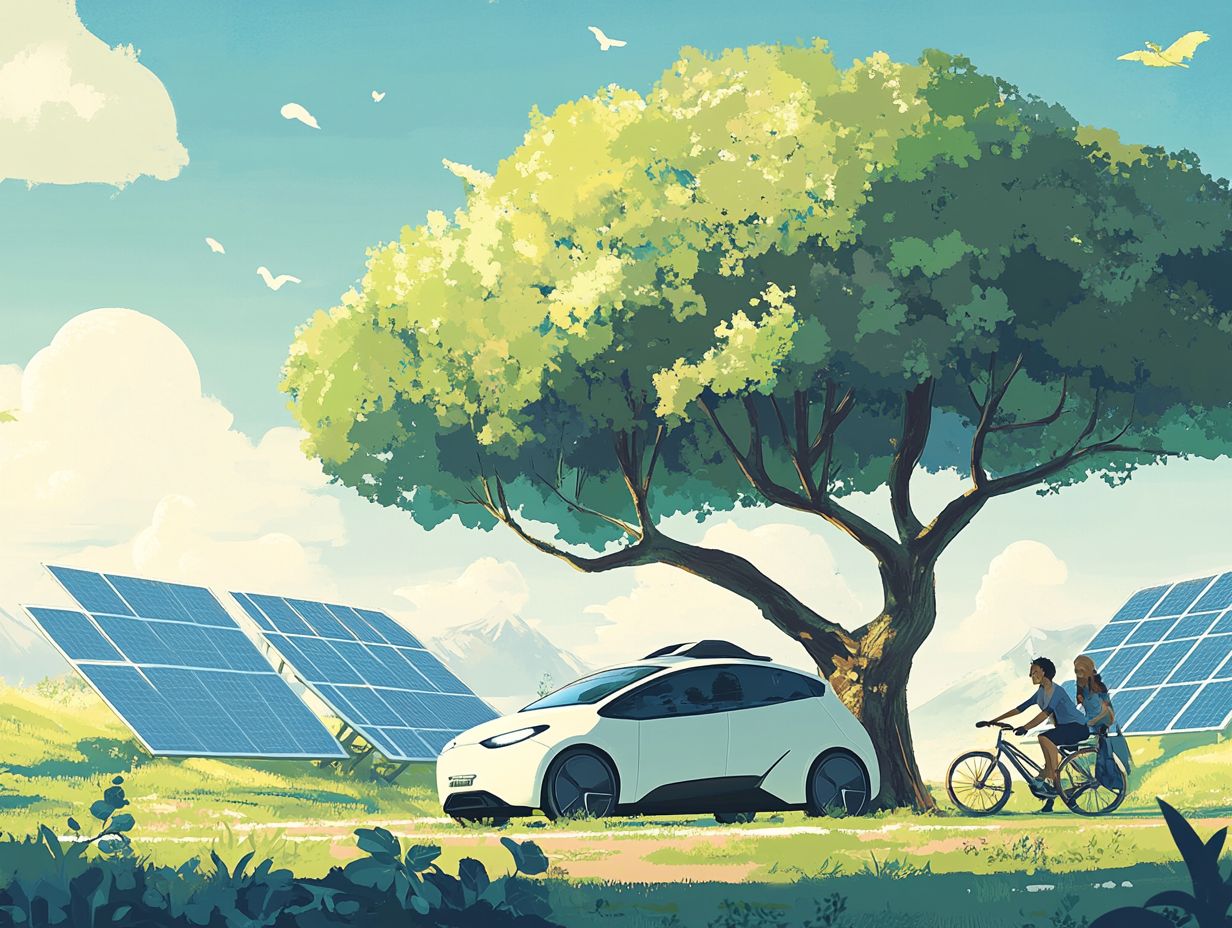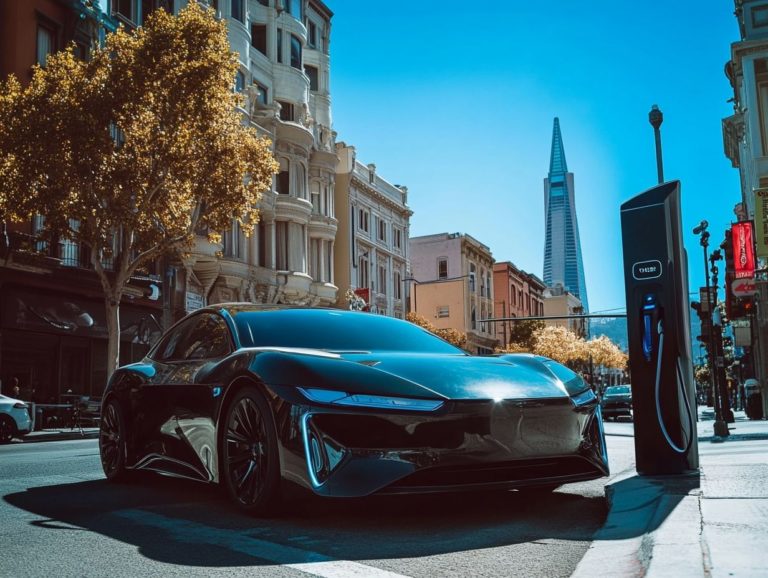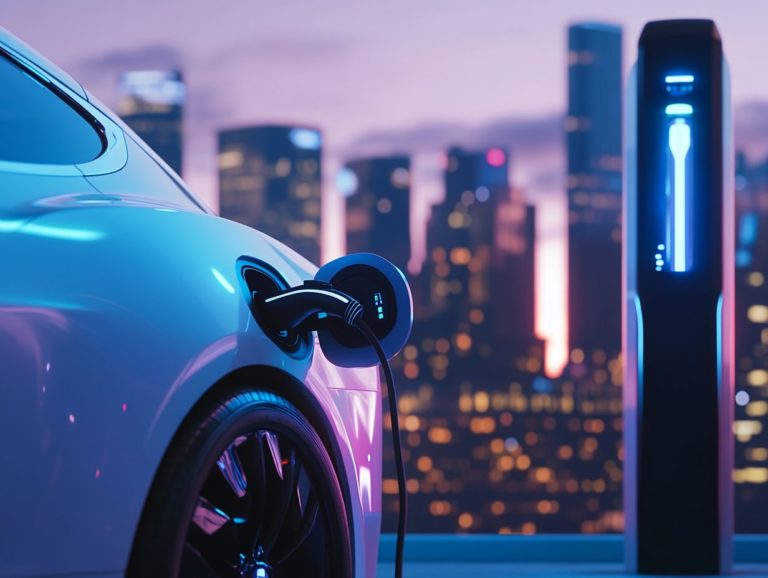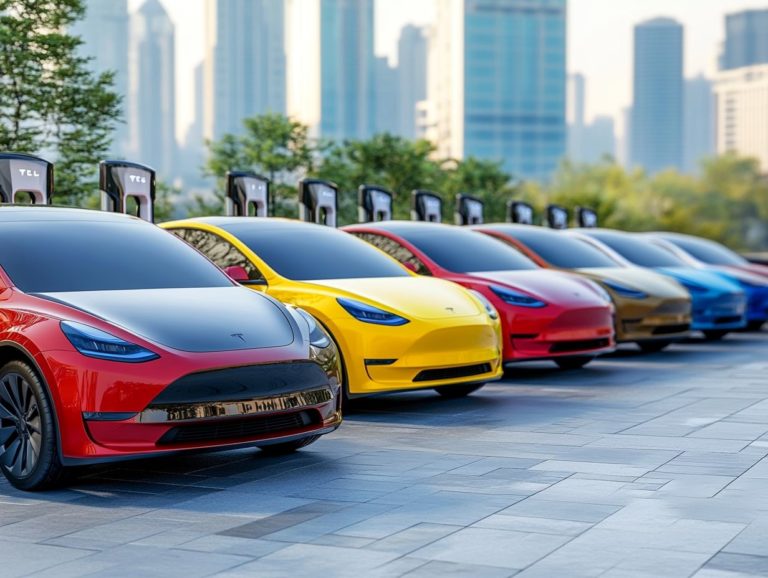44. the environmental benefits of electric cars
Electric cars are revolutionizing transportation and changing how we think about its environmental impact. As concerns about climate change, air quality, and natural resource depletion grow, electric vehicles (EVs) emerge as a sustainable alternative to conventional gasoline-powered cars.
This article explores how electric cars play a key role in reducing greenhouse gas emissions, minimizing air pollution, conserving resources, and saving you money as a consumer. Discover how electric vehicles can save you money while protecting the planet!
Join us in uncovering the myriad benefits that electric vehicles offer not just for the planet, but for your wallet too.
Contents
- Key Takeaways:
- What are Electric Cars?
- Reducing Greenhouse Gas Emissions
- Minimizing Air Pollution
- Impact of Electric Cars on Air Quality
- Conserving Natural Resources
- Using Less Fossil Fuels
- Reducing Water Consumption
- Cost Savings for Consumers
- Unlock Savings with Government Incentives!
- Frequently Asked Questions
- 1. What are the main environmental benefits of electric cars?
- 2. How do electric cars help reduce air pollution?
- 3. Do electric cars have a lower carbon footprint than traditional cars?
- 4. Can electric cars help combat climate change?
- 5. Are there any other environmental benefits of using electric cars?
- 6. Do electric cars have any negative environmental impacts?
Key Takeaways:

- Electric cars significantly reduce greenhouse gas emissions, helping combat climate change and preserving the environment for future generations.
- By minimizing air pollution, electric cars improve air quality and promote healthier living conditions for individuals and communities.
- The use of electric cars conserves natural resources by reducing fossil fuel consumption and decreasing water usage, making it a more sustainable transportation option.
What are Electric Cars?
Electric cars, often referred to as battery-powered vehicles, use electric motors instead of traditional gasoline engines. Models like the Tesla Model 3 and Nissan Leaf embody this transformative shift toward electric vehicle adoption, promoting sustainability and reducing dependence on fossil fuels.
Unlike gas-powered cars that burn fuel for energy, electric vehicles rely on large battery packs to store electricity. They operate with remarkable efficiency and have fewer moving parts. Key features include regenerative braking systems, which help recharge the battery while slowing down, electric chargers, and advanced management systems that optimize energy consumption.
The benefits of electric vehicles extend beyond environmental considerations; they also offer lower operating costs and reduced maintenance needs, while significantly highlighting the environmental impact of electric vehicles.
Major manufacturers such as Chevrolet, Ford, and Hyundai are investing significantly in this technology, recognizing its vital role in reducing CO2 emissions and addressing climate change. This investment marks a meaningful advance in global initiatives aimed at fostering a cleaner, more sustainable future.
Reducing Greenhouse Gas Emissions
Reducing greenhouse gas emissions is a top objective in the fight against climate change, and electric vehicles are key players in this mission. By significantly lowering CO2 emissions compared to traditional gas-powered vehicles, they provide a compelling solution, as confirmed by studies from the U.S. Environmental Protection Agency.
Embracing electric vehicles contributes to a healthier planet and places you at the forefront of sustainable innovation. You can make a difference today!
How Electric Cars Help Combat Climate Change
Electric cars play a key role in the fight against climate change by reducing reliance on fossil fuels and encouraging the use of renewable energy for transportation. This shift leads to a significant decrease in overall greenhouse gas emissions.
Transitioning from traditional gas-powered vehicles to electric alternatives lowers fossil fuel consumption, a primary driver of global warming. Integrating electric vehicles into power grids allows for the use of renewable energy sources such as solar and wind for charging.
This transformation fosters a cleaner energy landscape and aligns with international climate agreements, such as the Paris Agreement, which underscores the urgency of reducing carbon footprints worldwide.
As more drivers embrace electric vehicles, the opportunities to enhance energy efficiency and promote sustainable urban development grow exponentially.
Minimizing Air Pollution
Minimizing air pollution is a vital public health goal, and adopting electric vehicles plays a crucial role in this effort. By significantly reducing harmful emissions like PM2.5 and O3, which are often linked to traditional vehicles, electric vehicles enhance air quality and contribute to better health outcomes for the entire community. To learn more about this, check out the benefits of driving electric.
Impact of Electric Cars on Air Quality

The impact of electric cars on air quality is transformative. By producing zero tailpipe emissions, they greatly improve the air we breathe in cities. This improvement benefits public health by reducing respiratory diseases linked to pollution, demonstrating the environmental benefits of EV charging.
Recent studies show that cities embracing electric vehicles experience notable declines in nitrogen oxides and particulate matter, common pollutants from traditional gasoline and diesel engines. For instance, a report from the International Council on Clean Transportation reveals that urban areas with more electric vehicle usage saw air pollutants decrease by up to 25% in just five years, highlighting the benefits of electric vehicle recycling.
This cleaner air is associated with fewer asthma attacks, lower rates of heart disease, and other health-related issues, ultimately leading to longer life expectancy for residents.
Initiatives that promote electric vehicle adoption not only align with global sustainability goals but also create healthier, more environmentally friendly cities, paving the way for a brighter future.
Conserving Natural Resources
Conserving natural resources is vital for sustainable development, and electric vehicles play a key role in this effort. By reducing reliance on fossil fuels, they help preserve these precious resources while enhancing energy efficiency in battery production and usage.
Embracing electric vehicles is a significant step toward a more sustainable future.
Using Less Fossil Fuels
Electric vehicles greatly reduce fossil fuel consumption throughout their lifecycle compared to conventional vehicles, which are designed for energy efficiency. This advancement is crucial for reducing emissions.
Studies indicate that a traditional gasoline car can emit about 4.6 metric tons of CO2 annually, while electric cars produce zero tailpipe emissions, providing remarkable relief to the environment. For eco-conscious drivers, exploring the best electric vehicles can help further reduce your carbon footprint. When charging electric vehicles with renewable energy sources, the carbon footprint can decrease even further.
Since the transportation sector accounts for nearly 29% of total greenhouse gas emissions, switching to electric alternatives is essential for combating climate change. By reducing reliance on liquid fuels, electric cars not only contribute to environmental health but also improve air quality and enhance economic stability.
This shift decreases vulnerability to fluctuating oil prices and promotes energy independence, creating a more sustainable future for everyone.
Reducing Water Consumption
The production and operation of electric vehicles can significantly reduce water consumption compared to conventional fossil fuel vehicles, which depend heavily on extensive water resources for extraction and refining.
This distinction is particularly important when considering the entire lifecycle of each vehicle type, from raw material extraction to manufacturing and disposal. Fossil fuel extraction methods, such as oil drilling, require vast amounts of water not only for extraction but also for the refining that follows.
While electric vehicles do use water for battery production, they ultimately consume less water during both manufacturing and operation. By minimizing water usage, electric vehicles positively impact environmental sustainability and contribute to global conservation initiatives aimed at protecting freshwater resources.
Cost Savings for Consumers
Cost savings are one of the most compelling reasons to consider electric vehicles. They usually come with lower fuel and maintenance expenses, and additional benefits like tax credits and incentives enhance their appeal.
Lower Fuel and Maintenance Costs

Owning an electric car often means lower fuel costs and reduced maintenance expenses. This positions it as a more economical choice over time compared to traditional gas-powered vehicles.
This advantage arises from the efficiency of electric motors. They convert electricity into motion far more effectively than traditional engines that burn fuel.
Many electric vehicle (EV) owners enjoy savings that can reach several hundred dollars each year. These savings depend on local energy prices and individual driving habits.
Maintenance costs are significantly lower as well. Electric vehicles feature fewer moving parts, which minimizes wear and tear.
Prospective buyers often worry about the upfront cost and the availability of charging stations. However, studies reveal that the long-term savings frequently outweigh these initial challenges.
This makes EVs a smart financial move that saves you money.
Unlock Savings with Government Incentives!
Government incentives and support play an important role in promoting the adoption of electric cars. By providing tax credits and funding for charging infrastructure, these initiatives encourage consumers to transition from gas-powered vehicles to cleaner alternatives.
Using these incentives can make a significant difference in your journey toward sustainable transportation.
Encouraging the Use of Electric Cars
Encouraging electric car use is essential for reducing climate change impacts and enhancing public health outcomes. Effective incentives play an important role in this transition.
Start public awareness campaigns now to educate citizens about the environmental and economic benefits of electric vehicles (EVs). Spotlight advancements in battery technology, charging infrastructure, and the long-term cost savings associated with EV ownership.
Communities can invest in EV-friendly amenities, such as more accessible charging stations and designated parking spaces, making the transition more convenient for residents.
Policy incentives, including tax breaks and rebates for electric car purchases, can significantly motivate potential buyers. By fostering a supportive environment through collaboration among local governments, businesses, and organizations, you can help boost the adoption rates of electric cars, paving the way for a cleaner, healthier future.
Frequently Asked Questions
1. What are the main environmental benefits of electric cars?
Electric cars have several environmental benefits:
- Zero emissions
- Reduced air pollution
- Lower carbon footprint
2. How do electric cars help reduce air pollution?

Electric cars do not emit harmful pollutants, such as carbon monoxide and nitrogen oxides, which are major contributors to air pollution.
3. Do electric cars have a lower carbon footprint than traditional cars?
Yes, electric cars produce significantly lower carbon emissions compared to traditional cars, as they do not rely on fossil fuels for energy.
4. Can electric cars help combat climate change?
Yes, electric cars are considered a cleaner alternative to traditional cars and can play a crucial role in reducing greenhouse gas emissions and combating climate change.
5. Are there any other environmental benefits of using electric cars?
Aside from reducing air pollution and carbon emissions, electric cars also help reduce noise pollution, operating much quieter than traditional cars. For more insights, check out exploring the benefits of electric fleet vehicles.
6. Do electric cars have any negative environmental impacts?
While electric cars offer many environmental benefits, they do have some negative impacts, such as the production and disposal of batteries, and the reliance on electricity generated from non-renewable sources. It’s also important to consider the impact of electric vehicles on public health.






